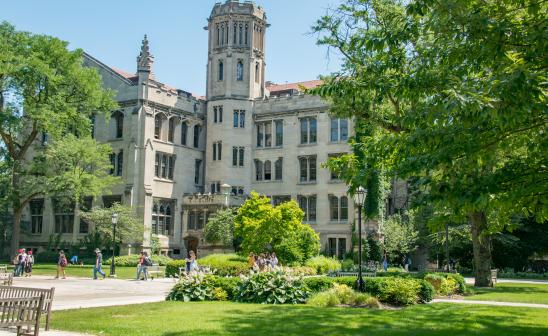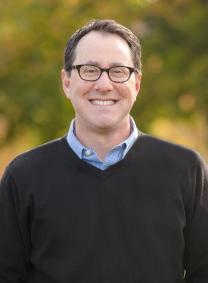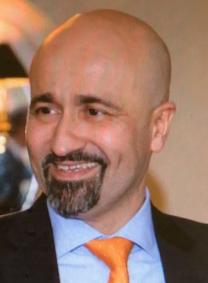Reaching Out and Tapping In: Alumni-in-Residence Event Recap

Two University of Chicago alumni offer their experiences with networking — online or in person — to further their careers
By Sarah Steimer
Having the perfect resume often isn’t enough to land you a dream job; it’s also about who you know.
“Social capital is incredibly valuable,” says Brian Portnoy, PhD’00 (Political Science) and founder of Shaping Wealth. He and fellow alumni-in-residence Rochdi Younsi, PhD’03 (History) and senior director of Middle East and North Africa for International Government Relations at Exxon Mobil Corporation, offered advice on building connections to gather sage advice and land coveted gigs.
“One of the core mistakes that graduate students, academics, intellectuals make is an over reliance on human capital,” Portnoy explains. He defines human capital as individuals’ ideas and intellect, drawn from experience and education. Social capital, on the other hand, is your network of relationships. Put the two together, he said, and you have a potent combination.
On Thursday, March 11, Portnoy and Younsi offered advice on how University of Chicago graduate students, postdoctoral fellows, and recent alumni could build social capital onto their existing wealth of human capital. Held via Zoom, the hour-long conversation, moderated by Katherine Kinzler, Professor in Psychology, was the first event of the Division of the Social Sciences new Alumni-in-Residence initiative. Nearly 40 students, post-docs, and alumni attended.
“Our alumni network include incredibly accomplished individuals with so many diverse pursuits. It’s fascinating to learn from their experiences and trajectories,” Kinzler noted about the initiative.
Tap into your existing networks — including LinkedIn
A good place to begin when building your own web of connections is to see what networks already exist. City-level alumni groups can be a great place to begin if you have a preferred location or industry in mind.
But an approach that is sometimes less common in the academic space — but still valuable — is to use LinkedIn, which allows you to conduct searches by company, people or location. Younsi says many recruiters and human resources professionals rely almost exclusively on LinkedIn in their searches.
“If you present yourself well, if you have the right keywords that reflect your experience and your objectives, you could get a lot of interest from recruiters,” Younsi says.
Tips from Younsi and Portnoy for building a good LinkedIn profile:
- Get the basics right. Your profile should be an updated representation of who you are: Your photo, where you went to school, what you study and any other relevant activities.
- Tell your story. Rather than just copy and paste your resume into your LinkedIn profile, use this space to tell your individual story: Post your professional mission statement and tell people what you hope to achieve. “A big part of networking is people buying into your vision of where you want to go,” Portnoy says.
- Take a cue from others. Carve out time to read others’ profiles. Use the content you like as inspiration to build your own page.
Connect with purpose
Both Younsi and Portnoy encourage thoughtful connections — and that starts with having the right attitude.
“Positivity sells,” Portnoy says. “With strangers that you're networking with, especially ones that you want something from, having a positive vision of where you want to go and having them buy into that vision is what you want to be doing over and over again.”
Being positive is also part of being empathetic toward your connection. As Younsi explains, this person is providing you with their time and energy, and you should be mindful of this. Remember to be polite and grateful, updating them on your progress as you hunt for a job. This is especially true when someone opens their own network to you, as they’ve put their own credibility on the line on your behalf.
And just as your LinkedIn profile should be concise, so should your goals for one-on-one networking. “Be very careful about asking people for their time to help you figure things out,” Portnoy says.
Set up time to network, and don’t be afraid to sell yourself
Portnoy recommends using an app or a spreadsheet to keep tabs on who you’ve reached out to and when to follow up or touch base. “Compounding takes place,” he says. “And all of a sudden, you're looped into ongoing conversations.”
Younsi says the pandemic actually created an opportunity to inject more humanity in his communications. “It doesn't hurt to reach out and say, ‘I hope that you and everybody around you is safe.’ It can have a huge impact on how the future of that relationship is going to evolve.”
The simple fact of networking is that you are selling yourself, so make the connections genuine. It’s not just about what you can get from your network, but what you can provide others as well. Reach out with a kind word or send someone an article that made you think of them.
“You do something for someone and they want to do something back,” Portnoy says. “It’s not cagey or nefarious.”
“AiR is really a partnership between the Division and our alumni,” says Clendinen. “There is so much knowledge that our alumni have gathered as students and as professionals that is incredibly valuable. This networking event was a great kickoff because it really got to the heart of that goal which is to share knowledge and build community which can only truly be done through networking.”
The next AiR event, What I Wish I Knew in Graduate School, will be Monday, April 5, at 5 PM CDT, with Alumni-in-Residence Neil Roberts, PhD' 07 (Political Science) chair and professor of Africana studies at Williams College. He will be joined by other alumni for the discussion. Register here.
The Alumni-in-Residence Program was launched in February 2021. Because Social Sciences alumni are thought leaders not only in research and higher education but also across a wide range of organizations, industries, and interests, their varied pursuits and experiences offer broad frameworks and models for current graduate students considering their own career aspirations. Through this exciting initiative, accomplished alumni engage with the Division’s programs and students in myriad ways, including 1:1 conversations, engagements with departments and degree programs, group events, and other programming. Learn more here or contact Chaevia Clendinen, Assistant Dean for Student Advancement and Diversity.
 THE UNIVERSITY OF CHICAGO
THE UNIVERSITY OF CHICAGO



